Christian
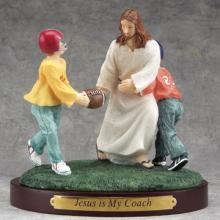
When God chose Denver Broncos quarterback Tim Tebow to be His witness to a hurting world, it might not have been clear that this was only a temporary calling. To be sure, during the regular season God was appreciative of Tebow’s on-field witness of kneeling in prayer and pointing skyward after every touchdown. After all, what better way to show the power of divine love than in front of millions of people drinking beer on the Sabbath.

You might not have a clue who Bieber is. Or, if you are aware of the existence of the crown prince of Stratford, Ontario, you might not give two hoots about him. But I’m guessing that there is a young person in your life who does.
So, for the sake of the children, please hear me out....
He is, in a sense, laying the groundwork for an awareness of the social gospel for a generation that will, sooner than we realize, become leaders in our society and our world.
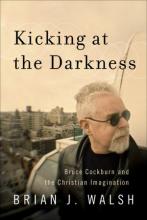
When a friend told me about this book late last year, I thought that all my Christmas had come early.
A theological treatise on Bruce Cockburn has been very necessary for years, but surely he was such a cult artist that no publisher would ever see a book on him as profitable. So fair play to Brazos Press for the courage and vision. And the author might have swayed the deal.
Walsh does a good few things in Kicking At The Darkness; Bruce Cockburn and the Christian Imagination. He confirms all your thoughts on your favorite Cockburn lyrics. (They were as theologically potent as you always thought!) He also reminds you how many great lines Cockburn has written, causing you to scuttle back to re-listen to every album right back to the first.
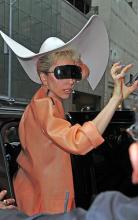
During all my reading about Robyn and Lady Gaga I came across some stuff about Lady Gaga that I found interesting, theologically speaking. As I told Jana over the summer, "I'm sort of developing a theological curiosity about Lady Gaga." Jana asked, "How so?"
Well, Lady Gaga calls her fans "monsters." Or "little monsters." And by that she means freaks--the odd, the weird, the lonely, the rejects, the nerds, the castoffs. And you can't help but wonder, in light of the gospels, about that demographic. In my book Unclean I have a chapter on monsters. And I've written about the theology of monsters on this blog. Consequently, Lady Gaga's use of the label "monsters" caught my attention.
Because as I've written, the category "monster" is charged with ambivalence. On the surface the monster is a normative threat--a defilement, a degradation, a location of moral and communal harm. Thus, monsters are expelled from community. And yet, most monster stories suggest that the monster is often a scapegoat. That the monster is more victim than victimizer. Underneath, if we could but see it, the monster is one of us.
So it's theologically apt that Lady Gaga uses the category monster for her fans. Because she's targeting a group that has been cast out of society. Again, she's explicitly embracing the freaks, weirdos and social outcasts. But Gaga, like in the monster stories, has flipped this and made the label "monster" a term of affection, welcome, embrace, community, inclusion and hospitality. (The diminutive "little" signals the playful affection.) This parallels my own interests in Unclean--Can we show hospitality toward monsters? So I'm intrigued by Gaga's community of "little monsters."
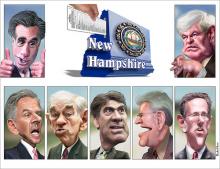
Tomorrow, New Hampshire votes. If there is one thing that I can tell you about my home state that might give insight into tomorrow’s voting, it is this:
It’s the only state in the country with the “right to revolution” written into it’s constitution. (Check it out, it’s article 10 in the N.H. bill of rights.)
The old Yankees of New Hampshire don’t like being told who to vote for. And, they especially don’t want to be told who should get their vote by anyone who works for a cable news company.
Remember how Obama was supposed to go on from Iowa to take New Hampshire sealing up the Democratic nomination? If they could throw a wrench into the GOP nomination process, I’m sure New Hampshirites would be proud to do so.
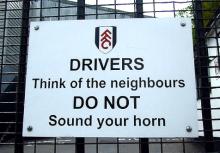
The Great Conversation that we invite our readers to join here at Sojo.net must, by definition, be both civil and respectful. Our comments sections should be a safe harbor, different from the comments sections of any other websites and blogs that deal with the busy intersection of religion, politics and culture.
To that end, during the last few weeks Sojourners staff and management have had a great many discussions about how we might best address the issue of incivility in our comments sections and correct it. We are committed to preserving the comments sections as a vital part of our community and that Great Conversation, but not at the cost of hearts and minds that have been wounded by their experiences here.
We can disagree, and we must when our conscience so demands, but we must do it with kindness, open minds and open hearts.

I have a number of identifiers on my various venues I write for and on my email signature: heretic, antagonist, father, son, instigator, pop culture junkie, theologian, social media guru, and so on. But one seems to resonate with folks more than any other: GOD NERD.
For some it’s just a funny juxtaposition of words. For others, there is something deeply relate-able in the moniker. Incidentally, the simple fact that I use words like “moniker” make clear the fact that I and a card-carrying, credentialed nerd.
The families in the show don't conform to distorted Muslim stereotypes that its critics had apparently hoped to see on All-American Muslim.

TeaVangelicals?
TEA-Vangelicas?
T-Evangelicals?
Whatever you call them, however you spell it, there’s a group of Evangelicals who have Tea Party hearts.
Some thought they’d swing for Bachman, but it looks like they’ve turned solidly behind Rick Santorum.

They are dangerous. And no, I’m not talking about the five Muslim families in Dearborn Michigan depicted in TLC’s new series All American Muslim.
I’m talking about the Florida Family Association(FFA). They are a group with a campaign targeting the show's advertisers and who have successfully gotten Lowe's to remove their commercials.
From the FFA website:
The Learning Channel's new show All-American Muslim is propaganda clearly designed to counter legitimate and present-day concerns about many Muslims who are advancing Islamic fundamentalism and Sharia law. The show profiles only Muslims that appear to be ordinary folks while excluding many Islamic believers whose agenda poses a clear and present danger to liberties and traditional values that the majority of Americans cherish. ...Clearly this program is attempting to manipulate Americans into ignoring the threat of jihad and to influence them to believe that being concerned about the jihad threat would somehow victimize these nice people in this show.
Yup. That’s their complaint. Having a show that would dare to depict “ordinary” Muslims.

When asked why he’s so vocal about his beliefs, Tebow says, "If you're married, and you have a wife, and you really love your wife, is it good enough to only tell your wife that you love her on the day you get married? Or should you tell her every single day when you wake up and have the opportunity? That's how I feel about my relationship with Jesus Christ."
Wow, I can see why God would like him. And why fans of Cinderella stories would too. This season, as the Bronco's starting quarterback, Tebow has led his team to several dramatic victories, battling back from trailing scores in the last quarter. He’s a gifted athlete, and one who seems to be genuinely humble about it.
Ridiculous. Ignorant. Racist. Dangerous.
These are just a few of the terms that flew out of the Middle East this weekend following Newt Gingrich’s unwelcome remarks about Israel and the Palestinians on Friday.
As the Republican front-runner, Gingrich was speaking to the cable TV Jewish Channel and hoping to curry favor with its conservative pro-Israel constituency.
What did he do? He described the Palestinians as an “invented people” and lumped every Palestinian under the terrorist umbrella. There is no difference between Hamas and the Palestinian Authority, he said.
On Saturday night during the ABC Republican debate, Gingrich doubled-down: “They [the Palestinians] are all terrorists.”
A few of the other candidates looked, well, alarmed.
I would never have been mistaken as a political supporter of President George W. Bush. But in his early days as president, I was invited to have conversations with him and his team about faith-based initiatives aimed at overcoming poverty, shoring up international aid and development for the most vulnerable, and supporting critical agendas such as international adoptions of marginalized children and the broken domestic foster care system.
My invitations to the Bush White House ended when I strongly and publicly opposed the Iraq War. But I continued to support the administration’s efforts to combat poverty and disease, especially Bush’s leadership in combating HIV/AIDs, malaria, and massive hunger in the poorest places in Africa.
That agenda was called “compassionate conservatism” and I was grateful for it. Back then, Republican leaders could be fiscally conservative, favor “small government,” and believe in the free market, for example, but also believe that government should and must partner with the private sector — especially non-profit and faith-based organizations — to help lift people out of poverty, both abroad in the developing world and here at home in the richest nation on the planet. Such a conviction requires two things: A genuine empathy and commitment to the poor, and a more balanced and positive view of government — neither of which were much evident in the GOP’s right-wing quarters, where the compassionate conservative agenda was opposed by party leaders such as Tom DeLay and Dick Armey.
I met people like Mike Gerson, who was then George Bush’s chief speech writer and a policy advisor, and is now a columnist for the Washington Post. I was told it was Gerson and the Bush himself who often were the ones to stand up for the compassionate conservative vision at Oval Office meetings.
Self-identifying as an Evangelical might get me labeled a political activist. Yes, I’m an Evangelical. I’m also a Republican. But touching these two labels together invokes pictures of voting checklist guides, culture wars, and the case of Visine needed to make Michelle Bachmann eyes blink. I‘m not a militant, taking the country back for God.
So am I an Evangelical? Did you know that the family name is actually Swiss-German? That explains our passive-aggressive nature.
The term "Evangelical" is like a pair of hand-me-down underwear. It's been stretched over so many shapes and sizes that it's lost its snap and doesn't fit anyone anymore. It’s been pulled around the circumference of Mars Hill, Seattle and Mars Hill, Grand Rapids. Billy Graham, Ted Haggard, Jim Bakker, Jay Bakker Benny Hinn, Scot McKnight, Don Miller, Jimmy Carter, W., John Piper, Ken Ham, Jim Wallis, and Bill Hybels have all had their turn sporting this hand-me-down garment.
Ask me if I’m an Evangelical and I’ll ask if you know where that label’s been. It’s rubbed against far too much junk for my taste.
Words lose their currency with overuse, it’s true. But it’s also true that a large part of my issue with being labeled an Evangelical is vanity.
Today is Black Friday, the unofficial holiday immediately following Thanksgiving. Today, businesses open very early, offering reduced prices on all manner of consumer items. Customers are encouraged to flood the aisles in search of a good deal on all kinds of things - from DVDs to appliances - but, above all, electronics.
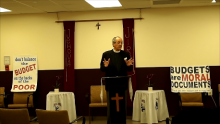
“The problems of homelessness and poverty are not self-inflicted, they are the result of priorities of our society and those priorities are not centered on people but on gathering more wealth for a small number of people. Many of us [homeless people] – despite the stereotypes – drew deeply on our faith and the fact that we’re all children of God and organized ourselves. We’re homeless, not helpless. That’s why our call is to work with us and not for us.”
— Willie Baptist, Scholar-in-Residence The Poverty Initiative at Union Theological Seminary
The Norton commercial says explicitly what most advertisements only imply.
You are the things you own.
Your identity is the stuff you have.
Your worth is what you own.
Christians are called to be peacemakers and healers. Disagreement on policy does not excuse us from a responsibility to help those who come home broken and in need of help.
You might call yourself a pacifist, a just-war theorist, a pragmatist, a dove or a hawk but today (and every day), you should be a good neighbor to a veteran.

I always notice something when speaking to a mostly secular audience. Many people have been so hurt or rejected by the bad religion in which they were raised or have encountered elsewhere over the course of their lives, and, quite understandably, they are skeptical and wary of the faith community. But when someone looks like a faith leader (this is where the ecclesial robe helps ) and says things that are different from what they expect or are used to, their response is one of gratitude and the moment becomes an opportunity for healing.
After I spoke Sunday and joined the circle around the White House, person after person came up to me to express their thanks or simply to talk.
My favorite comment of the day came from a woman who quietly whispered in my ear, "You make me almost want to be a Christian."